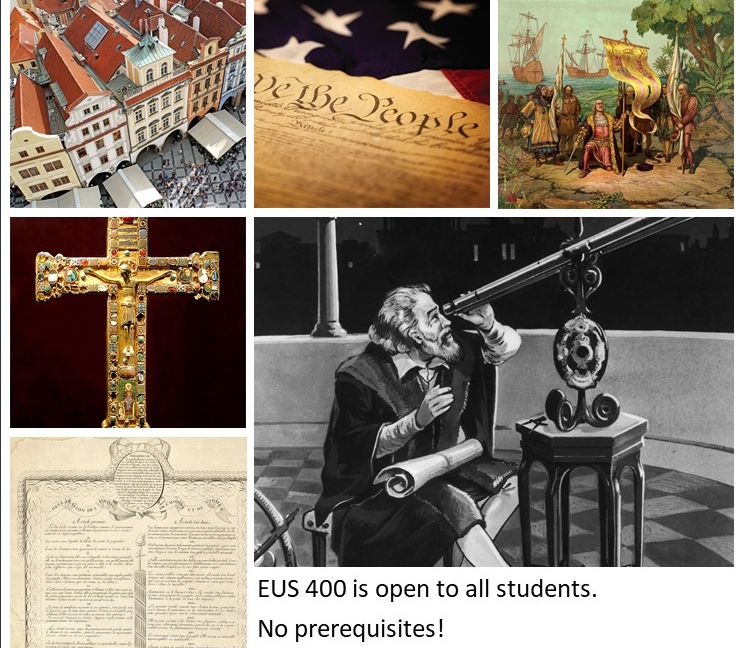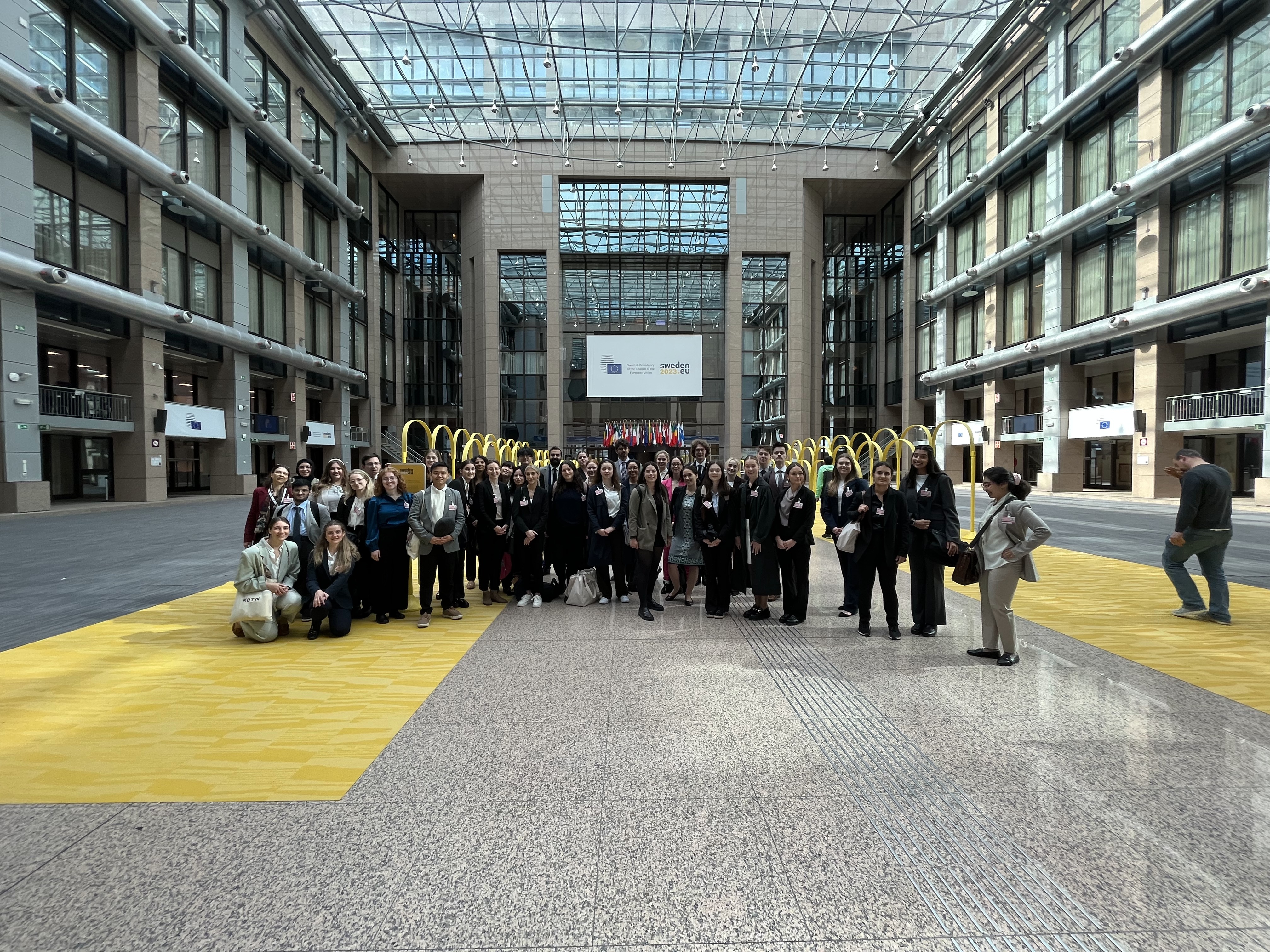The European Studies (EUS) program takes an interdisciplinary approach to European integration. By coordinating the disciplines of politics, geography, history, culture, language, law, and economics, students achieve a unique understanding of European integration and its significance. Students in our program will hear from professors and experts in several fields and access opportunities to travel and study. European studies is a dynamic, unique, and highly flexible program that allows students to follow their interests and explore pressing issues from a new perspective.
EUS 100 - Fall
Introduction to European studies

The European Union consists of 27 European countries. The continent has a rich and varied history as the birthplace of many important ideologies, art forms, and political institutions.
This course gives a broad introduction to the wide range of topics explored by the European Studies Program, starting with a ‘Tour of Europe’. In class, we examine different European countries on their own, as well as in relation to each other and to the EU. In doing so, we focus on key issues and contemporary thinkers associated with the study of European integration. This is an interdisciplinary course, including the areas of politics, history, language, law, and economics. Some topics include the history of modern Europe, the debates and ideas behind the creation of the EU, and the cultural and political ramifications of ‘East-West’ legacies in Europe. The course also examines a number of current events and recent challenges facing the EU, to include the debt crisis, identity politics, and issues surrounding further political integration.
EUS 200 - Spring
Introduction to European cultures and identities

This course explores the evolving and interconnected cultural dialogues of European societies as they relate to one other and the world at large. The particular experiences and cultural innovations of each European society contributes a piece to a puzzle, which considered together paints a narrative of at times contrasting and at times complementary identities.
We will consider, for instance, how Ancient Greek ideas of democracy were enriched by Roman notions of cosmopolitanism, how Mediaeval European societies were enriched by interactions with Jewish, Muslim and Christian cultures on the Iberian Peninsula, and how European sciences arose in conjunction with artistic developments in Renaissance Italy. Throughout the course, issues such as religious intolerance, imperialism and colonialism are critically examined, as well as the collaborative endeavours that are at the root of the relative prosperity of Europe today.
EUS 311 - Spring
Governments and Politics in Europe

Historical backgrounds to, institutional framework for, and players involved in, political conflict in European countries. Consideration is given to contemporary policy issues and the process of European integration.
EUS 400 - Fall
The European Legacy

Course Description
You use the term “Western culture,” but do you know what that really means? What are its defining values and where did they come from? In this interdisciplinary seminar course, you will explore the roots of western culture in the narratives of shared values that accompanied the historical emergence of something called “Europe”, and identify the legacy of these narratives in some of the most pressing issues of our times.
Our inquiry will revolve around four mutually implicit, double-edged themes:
1) faith/tolerance; 2) the value of the individual; 3) cosmopolitanism; 4) knowledge as universal truth. For each of these, we will examine historical sources and seek out its ongoing operation in current events. Weekly synchronous seminars and asynchronous online forums will provide an opportunity for you to share ideas, review readings and integrate course material toward a final term paper on a topic of your choice.
Intended Learning Outcomes
In this course you will gain a more complex, critical and historical understanding of the roots of western culture, the nature and source of its defining values and how they continue to operate in our present. You will be challenged to become more attentive readers, better writers, and more critical thinkers and cultural observers. You will have the opportunity to devote the semester to developing a research paper on a topic of your own choice, including developing an abstract and bibliography, and presenting your work to colleagues.
Taught by Dr. Nina Belmonte
EUS 390A - Summer (EU Study Tour)
Directed studies in Europe I

EUS 390A is the for-credit course students must take when accepted to the EU Study Tour (EUST).
EUST takes place in May of each year which starts and ends in Brussels, but also takes students to Luxembourg and Frankfurt as they visit key institutions of the European Union, as well as civil society and other organizations, such as NATO, the European Court of Human Rights, and the Canadian Mission to the EU.
The administrative home of the EUST is UVic, but the majority of the students are from other Canadian universities. Over half the EUST students stay in Europe to complete an internship at the European Commission, the European Parliament, or a civil society organisation. For more information and past programs, please visit the EUST homepage.
Please view the most recent EUS 390A (1.5 credit) course outline here.
[Note: the 0.0 credit course in the below calendar, i.e. EUS 390B is only available to some of the students from other universities that have been admitted to the field school].
EUS 495 Directed Experiential Learning
Individual examination of analytical issues in European Studies in relation to work, internship, volunteer activities, or other pre-approved activities under the guidance of a faculty member. Student and instructor must have agreed on learning objectives and methods of assessment before experiential learning opportunity begins. Learning opportunity must be distinct from any previous or concurrent Co-op work-term placements. Must involve a minimum of 200 hours of the activity per 1.5 units of credit.
*Credit for EUS 495 may be applied to West Coast Model EU.
EUS 490 Special Topics in European Studies
Directed reading and/or a research project in European Studies under the supervision of a Faculty Member.
1.5 Units
Sessional Lecturer opportunity in the Faculty of Humanities European Studies Program
The deadline for applications is August 7, 2024.
See the job posting for details.
